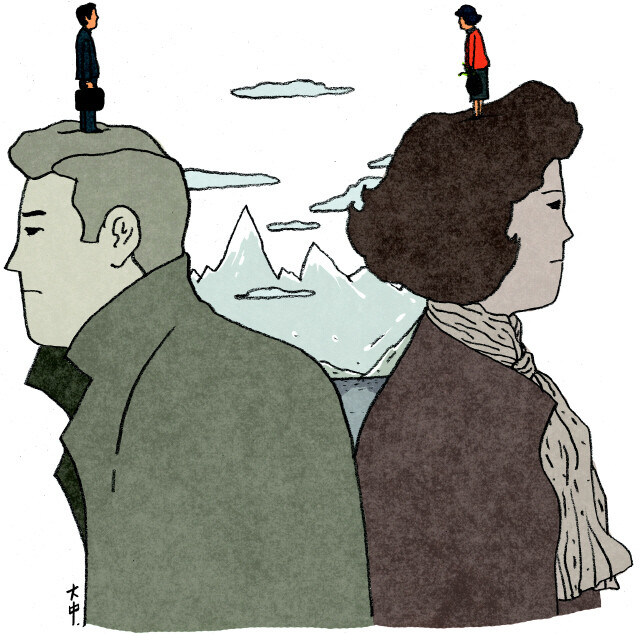hankyoreh
Links to other country sites 다른 나라 사이트 링크
South Korea’s aging society means longer and more stressful marriages

The aging trend in South Korea’s population has brought longer durations in marriages. For the baby boom generation born between 1955 and 1963, some predictions have couples living 14 times longer together after their children leave home than their parents’ generation.
According to Statistics Korea’s population and housing census for 2015, a total of 1,693,925 households were married couples aged 60 and older. The number of senior couples has been growing sharply, with 851,104 counted in 2000 and 1,410,425 in 2010. A person born in 1955 - the oldest of the baby boomers - would be 61 this year. The number of senior couples is expected to rise even more as the huge demographic group represented by the boomers enters their sixties. A Statistics Korea estimate of future households based on 2010 census figures predicted the number of senior couple households will reach 3,660,512 in 2035. A total of 1,028 couples will both be centenarians. Last year, couples over 60 accounted for 56.8% of all married households; by 2035, that number is expected to rise to 72.4%.
A 2011 analysis by Seoul National University human ecology professor Han Gyoung-hae based on data from a panel study on baby boomers calculated the generation’s child-bearing period at 3.4 years, far less than the 9.1 for their parents’ generation (those married between 1955 and 1964). The child-bearing period refers to the period from a couple’s first birth to their last. The empty nest period, or the time between when children leave home and one member of the couple dies, was just 1.4 years for the parents’ generation, but 19.4 years for the baby boom generation.
“Small numbers of children and increasing average life expectancy are bringing major changes to the family life cycle,” Han said.
Women are subject to more stress than men as couples live together longer. For households where retirement comes in the members’ early fifties, the time spent together is increasing to an average of 30 to 40 years for the post-retirement period alone. Many males also seek to maintain a traditional patriarchal relationship where household chores are considered the woman’s job. Experts have pointed to this as an emerging source of conflict within the family.
According to Statistics Korea figures on elderly people in 2016, males’ reported satisfaction with their spousal relationship was roughly 8 to 12 percentage points higher than their wives’ in 2014. In an analysis of 2,669 people older than 65 who took part in a national health and nutrition survey for 2010-12, professor Park Bo-yeong of Chungbuk Health and Science University found women‘s stress levels to be 3.21 higher than their husbands’ in married households, and their incidence of depression to be 1.75 higher. Wives were also 2.04 more likely than their husbands to report having considered suicide in the past year.
A related phenomenon is summed up by the recent coinage jolhon - a term meaning “marriage graduation.” It refers to couples who live together and continue freely pursuing their interests without divorcing. The term comes from the Japanese word sotsukon, reported in the 2004 book “A Recommendation for Marriage Graduation” by Yumiko Sugiyama - published in a country where the aging trend is already far more advanced than in South Korea.
By Hwangbo Yon, staff reporter
Please direct questions or comments to [english@hani.co.kr]

Editorial・opinion
![[Column] Season 2 of special prosecutor probe may be coming to Korea soon [Column] Season 2 of special prosecutor probe may be coming to Korea soon](https://flexible.img.hani.co.kr/flexible/normal/500/300/imgdb/original/2024/0426/3317141030699447.jpg) [Column] Season 2 of special prosecutor probe may be coming to Korea soon
[Column] Season 2 of special prosecutor probe may be coming to Korea soon![[Column] Park Geun-hye déjà vu in Yoon Suk-yeol [Column] Park Geun-hye déjà vu in Yoon Suk-yeol](https://flexible.img.hani.co.kr/flexible/normal/500/300/imgdb/original/2024/0424/651713945113788.jpg) [Column] Park Geun-hye déjà vu in Yoon Suk-yeol
[Column] Park Geun-hye déjà vu in Yoon Suk-yeol- [Editorial] New weight of N. Korea’s nuclear threats makes dialogue all the more urgent
- [Guest essay] The real reason Korea’s new right wants to dub Rhee a founding father
- [Column] ‘Choson’: Is it time we start referring to N. Korea in its own terms?
- [Editorial] Japan’s rewriting of history with Korea has gone too far
- [Column] The president’s questionable capacity for dialogue
- [Column] Are chaebol firms just pizza pies for families to divvy up as they please?
- [Column] Has Korea, too, crossed the Rubicon on China?
- [Correspondent’s column] In Japan’s alliance with US, echoes of its past alliances with UK
Most viewed articles
- 1‘We must say no’: Seoul defense chief on Korean, USFK involvement in hypothetical Taiwan crisis
- 2After election rout, Yoon’s left with 3 choices for dealing with the opposition
- 3Why Kim Jong-un is scrapping the term ‘Day of the Sun’ and toning down fanfare for predecessors
- 4AI is catching up with humans at a ‘shocking’ rate
- 5Two factors that’ll decide if Korea’s economy keeps on its upward trend
- 6Division commander ordered troops to enter raging flood waters before Marine died, survivor says
- 7[Column] Park Geun-hye déjà vu in Yoon Suk-yeol
- 8[Editorial] Korea’s surprise Q1 growth requires objective assessment, not blind fanfare
- 9No good, very bad game for Korea puts it out of Olympics for first time since 1988
- 10Noting shared ‘values,’ Korea hints at passport-free travel with Japan